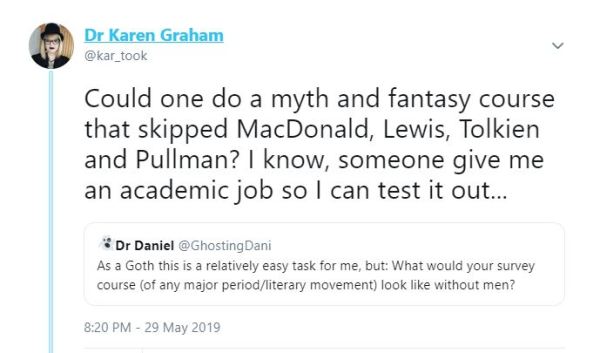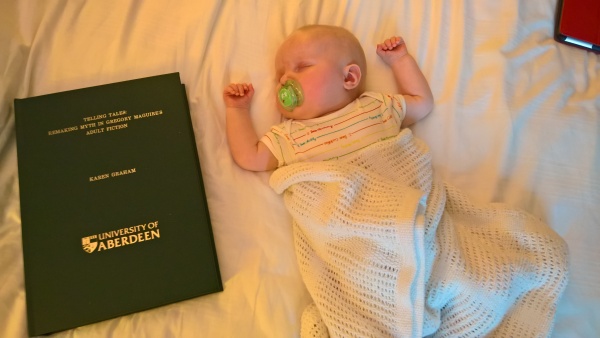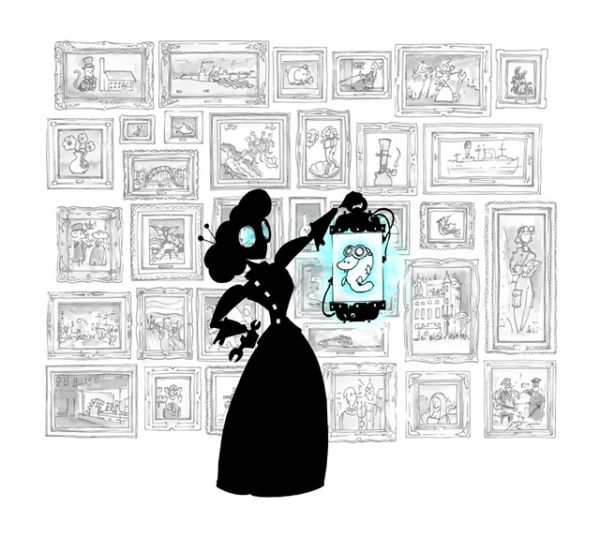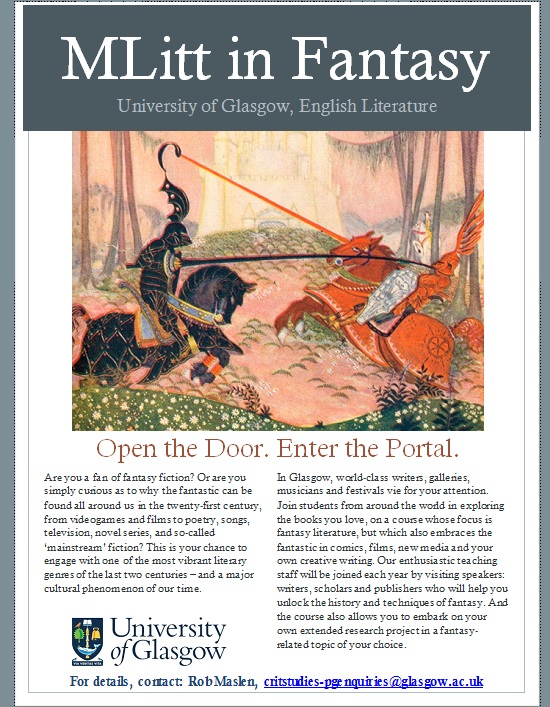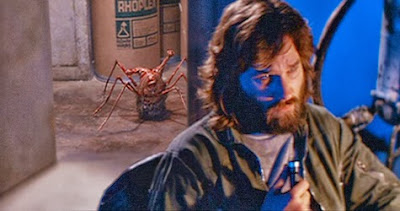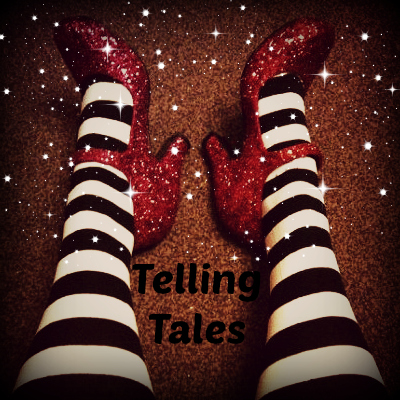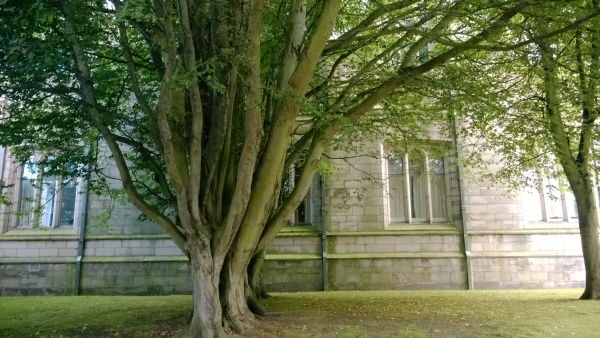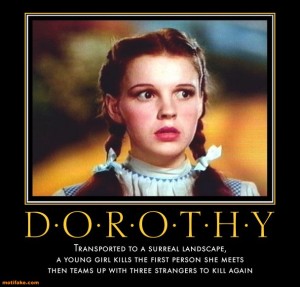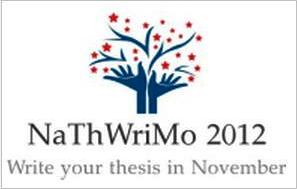Prompted by Dr Daniel on Twitter, I began creating an imaginary literature course on Myth and Fantasy that consisted on only female writers. With a little help from a few colleagues and friends, whose suggestions you can read in the twitter thread, I've come up with the following course reading list outline. Given the size,... Continue Reading →
The difference a year makes: 2017 round-up
It's well been over a year since my last proper post on here, and I figured it was about time for an update on what I've been doing. I passed my viva with minor corrections in July 2016 and graduated in June 2017. The reason for the long delay between those two dates - over... Continue Reading →
The Old Gods and the New: Religion in Westeros and Beyond
 Illustrated by Mia Carnevale
Illustrated by Mia Carnevale
Just as George R. R. Martin draws inspiration from real-world history and politics to add depth to his world in A Song of Ice and Fire (or, as HBO would prefer, Game of Thrones), so too does he look to real-world religions.
Religion, a central aspect of medieval culture, is also an important theme throughoutA Song of Ice and Fire: it pushes the story along, develops characters, and fleshes out an immensely complex world. Many different faiths are depicted and are all shown to have their own power, whether it be politically, in the strength of their followers, or magically.
Drawing from the books and the show, here are three of the major religions in the series, the roles they play within the story, and their real-life historical and contemporary counterparts.
1. The Drowned God
We Do Not Sow
The Drowned God is…
View original post 949 more words
Fabricating Histories: Steampunk, Neo-Victorianism, and the Fantastic — Interesting Literature
By Claire Nally A new exhibition on Steampunk and Neo-Victorian culture opens in November – entitled Fabricating Histories, it explores the ways in which we can think about, and challenge, the legacy of history. Dr Claire Nally, co-curator of the exhibition at the Discovery Museum (Tyne & Wears Archives and Museums) in Newcastle, explains what […]... Continue Reading →
Monstrously Good Fun with Sheffield Gothic
I've neglected the blog somewhat while I've been in post-submission/pre-Viva limbo. This is mostly because I was lucky enough to be able to switch to full time hours just as I submitted. While I'm still waiting on the Viva, I have kept my hand in academically witch conferences, seminars and academic discussions on social media and... Continue Reading →
CFP Deadline Extension
We are extending the deadline for abstract submissions to the slightly more Gothic 13th March. (Unfortunately a Sunday rather than a Friday.)
A short version of the CFP is included below. For a more comprehensive call for papers, including an extended discussion of the theme and examples click here.
We invite 20-minute papers on all aspects of Gothic time in art. Suggested topics and themes include (but are not limited to):
- Temporality in classical Gothic texts
- Ruinophilia
- Explorations of ruin and decay in the arts
- Spectres of the past or future
- Time and decay in the Gothic
- Temporal ruptures, such as regression, progression, displacement or echoes
- Gothic spaces that function outside or beyond time
- Parallel universes, ruptured time and relativity
- Temporal excess that “real” time cannot contain
- Traumatic time, temporal wounds and repairing time
- Timelessness and immortality
- Fundamentalism as regression
- Medievalism in the Twenty-first century
- The “found manuscript”…
View original post 78 more words
Radical Fairy Tales and Little Monsters
I hope you've all been enjoying the succession of CFPs that have severed as substitutes for my updates of late. I'm currently in academic limbo between submission and viva. I've also increased my hours at work, and so have been rather lax on updating here. Submitting was equal parts stressful and underwhelming. Because I now... Continue Reading →
Nine Worlds: Religion Track Talk and Schedule
I'll be speaking at Nine Worlds Geekfest this weekend on the Religion track. I'm a late addition to replace on of the talks, so I'm not showing on the schedule. I'm now on the track schedule, and will be speaking in the 5pm panel on Saturday in room 32. I'm replacing 'Religious Origins of Modern... Continue Reading →
Registration for Company of Wolves now open
Registration has now opened for the Company of Wolves conference. Taking place at the University of Hertfordshire from the 3rd-5th September, the conference features plenary presentations from Sam George, Neil Jordan, Catherine Spooner, Stacey Abbott, Marcus Sedgwick, Bill Hughes, Garry Martin and Christopher Frayling. I'm presenting some new research on the figure of the hybrid... Continue Reading →
Company of Wolves: Conference Programme
The programme for the Company of Wolves conference has been announced. This will be my first conference after I’ve submitted my thesis and OGOM was also the first conference I did as a PhD student at Aberdeen, so an extra special one.
The provisional programme for the Company of Wolves conference is now up on this website: select ‘Conference Programme‘ from the ‘Company of Wolves’ menu (or click on the link).
Most of the abstracts are now viewable from the ‘Session Speakers and Abstracts‘ page; we are still waiting for some contributor’s biographies before all the abstracts are uploaded.
Review of Other Worlds
An edited version of this review appeared on ShortbreadStories.com on 8th June 2015. In May I visited the British Academy in London for two of the events in their Literature Week programme. This was the British Academy’s fourth biennial Literature Week and a range of public events around the theme of ‘Other Worlds’: exploring the... Continue Reading →
The Hunting of the Snark or In Search of a Final Draft
While I'm back to blogging and sharing CFPs, I'm not quite at the stage of turning the thesis in. I'm awaiting comments from my second supervisor, who is generally more thorough and critical than my first.* Following generally held advice on idle hands and devils' work, I'm re-revising the current thesis draft. One of the critiques... Continue Reading →
Imposter Syndrome – the cat amongst the pengiuns
Imposter syndrome – we all have it. I’ve yet to meet anyone, academic or otherwise, who hasn’t felt like they were playing at being a grown up. This post from BloggerByResearch sums it up nicely. And I have the same insecurities about being petite and female. I’m not sure if that confirms these insecurities, or just points out that it’s merely physical.
There was a particularly poignant moment a few years ago when Husband had submitted his PhD, but hadn’t yet had his viva and was not getting anywhere with finding a job. I could only reassure him as his wife that he was a smart and capable individual, but not as a fellow academic because we are is very different fields. The best thing I could come up with was to make him watch a graduation commencement speech from the New England Institute of Arts, given by Amanda Palmer on the Fraud Police.
As I’m now pretty close to embarking on exactly the same process, I think it’s time to revisit it for myself. For some reason, knowing that someone who has a pretty successful career as a musician still fears the fraud police is comforting and motivating at the same time. You can watch it here.
As for Husband, the day he passed his viva with minor corrections was also the day he was offered the Post-doctoral Research position he’s in at the moment. I know the chance of lightning striking twice for us is slim, but at least it gives me hope.
This week I admitted that I worry that I am not good enough to do a PhD. I often think that I don’t have the intelligence or research skills to get anywhere with it. I feel nervous when going for supervision meetings as I don’t think I have done enough work or work of any worth. Coming out of those meetings I feel reassured and quite good about it all and this lasts for about a week until it kicks back in again.
I told a friend about this and she told me about Impostor Syndrome.
Impostor syndrome[1] is a psychological phenomenon in which people are unable to internalize their accomplishments. Despite external evidence of their competence, those with the syndrome remain convinced that they are frauds and do not deserve the success they have achieved. Proof of success is dismissed as luck, timing, or as a result of…
View original post 481 more words
CFP Company of Wolves: only ten days left to submit and actually walk with wolves!!
A timely reminder if, like me, you’re planning on submitting an abstract for the ‘Company of Wolves’ conference at the University of Hertfordshire and haven’t yet.
I’m going with shapeshifting, hybridity and social change. How about you?
Following my post yesterday where I lamented the last wolf and talked about Maggie Stiefvater’s ‘Wolves of Mercy Falls’ Shiver books, Radio 4 today featured a discussion of this very topic – in a moment of surprising serendipity. Again, this burst of awareness is extremely timely for our Company of Wolves Conference.
In The Last Wolf Tom Holland meets up with one of Britain’s leading conservation writers Jim Crumley at Stirling castle to discuss the myth of the last wolf.
The symbol of Stirling is a wolf and this refers to a story where the howl of a wolf alerted local people to a Viking raid is the 9th or 10th century. But, after this there are few stories of wolves doing humans a good turn. Invariably, the wolf is ‘bad’ a danger to livestock and children. So much so that Edward 1st paid a bounty to have the wold…
View original post 154 more words
Folklore Resources – This is not a blog
I'm not really blogging and I am still on hiatus while I finish the thesis but I've just come across a really good list of folklore studies resources complied by Ohio State University: https://cfs.osu.edu/about/resources/journals This is a very useful list for two reasons. The first is obviously that it collates a wide range of resources... Continue Reading →
Your Minimum Editing Route and How Fonts Can Help You Spot Typos
Proofing and editing is in my future still, nonetheless this is good advice to have to hand.

I work with words all the time. I have to be careful not to gloss over my writing. If I do, I risk missing typos and worse.
Even with a clear focus, it’s bad enough. Your focus is on conveying meaning more than it is on uncovering typos.
But there’s hope. When you edit your work, go through several runs at the text. First, read for overall flow. Second, read for clarity. Third, read for typos. This should be your minimum editing route.
Editing for different reasons each time helps you to focus on the particular task at hand. These tasks require thinking processes that do not gel with each other. If you tackle them all at the same time, it’s like ineffective multitasking.
Read out loud and look at each word, no matter how trivial. When you read with purpose, you’ll trip over sentences that clearly need…
View original post 220 more words
thesis know how – beware the quote dump
Reblogging for myself and anyone else who is currently grappling with the balance of their own voices and the voice of the critic in their thesis. I’ve gotten some very good advice on this issue that I’ll be putting into practice today, but as always Patter hits the nail on the head with why we tend to rely on large quotations.
I very often see first drafts of theses – and sometimes completed ones – which suffer from quote dumping. A quote dump is when the writer inserts a very large extract of someone else’s words into a text and then does nothing with it. The quote sits there, highly visible in its indented and italicised state, inert, unyielding, impenetrable.
The quote dump often occurs in literature chapters and/or when the thesis writer is discussing theoretical literatures. It’s sometimes used when people are explaining their methodology. It can happen when people genuinely attempt to engage with other people’s words and ideas and either challenge them, evaluate them or make them into foundations for their own research.
While quote dumping might have been the way to get good marks in essays in undergraduate and Masters work, it is a learned strategy that doesn’t fly so well in a doctoral thesis. Yes, the…
View original post 520 more words
Goodbye world
I've just received an email from the Supervisors about Project Frankenthesis and the long and short of it is that I've got to seriously get my head down. There's nothing overtly negative in their feedback, but it does say out loud what I've known and been ignoring for a while - the central tenet of... Continue Reading →
Fantasy MLitt at the University of Glasgow
Things have come a long way since I did my MLitt in 20*mumble mumble*. Even though I did a course that was considered quite different at the time, it was in a very established academic subject area. While my MLitt dissertation was on a fantasy text, I had to alter the focus of my research... Continue Reading →
MedHum Monday Presents: The Power of Story
Fantastic post from Brandy on Medical Humanities (Med Hum), Gothic science: Dread & Discovery and the power of story.
OGOM Company of Wolves CFP – Beyond excited to announce this!
Way back in the mists of time, before I started my PhD, I attended a conference at the University of Hertfordshire called Open Graves, Open Minds. I gave a paper on the monstrous female in the Twilight series, ate lunch from a coffin, bought many books and made some friends for life. The Open Graves, Open Minds project has launched the CFP for it’s next conference,The Company of Wolves, and I can’t wait.
Conference, University of Hertfordshire, Sept 3rd-5th 2015: Call for Papers and Panels
OGOM: ‘The Company of Wolves’: Sociality, Animality, and Subjectivity in Literary and Cultural Narratives—Werewolves, Shapeshifters, and Feral Humans
 Wolves have long been the archetypal enemy of human company, preying on the unguarded boundaries of civilisation, threatening the pastoral of ideal sociality and figuring as sexual predators. Yet, in their way, with their complex pack interactions, they have served as a model for society. Lately, this ancient enemy has been rehabilitated and reappraised, and rewilding projects have attempted to admit them more closely into our lives.
Wolves have long been the archetypal enemy of human company, preying on the unguarded boundaries of civilisation, threatening the pastoral of ideal sociality and figuring as sexual predators. Yet, in their way, with their complex pack interactions, they have served as a model for society. Lately, this ancient enemy has been rehabilitated and reappraised, and rewilding projects have attempted to admit them more closely into our lives.
Our company with wolves has inspired fiction from Ovid, through Perrault and the Grimms’ narrators, to Bram Stoker and Kipling; and, more recently, to Angela Carter, Neil Jordan, Anne Rice, Marcus Sedgwick and Glen Duncan.
The Open Graves, Open Minds Project was initiated in 2010 with the Vampires and the Undead in Modern…
View original post 759 more words
From Deerstalker Hat to Black Wool Overcoat: Timelessness in Sherlock Holmes’ Speculative Stories and Drama
Interesting look at Sherlock and how it relates to the Conan Doyle stories. I have a large section in Chapter One on the trope of the great detective as an example of sustained adaptation leading to myth-making. I hadn’t considered “timelessness” as a quality that participates in this process before now. Definitely something to consider.
This review contains spoilers.
BBC’s Sherlock is my favorite TV series. The 2012 reboot of the Victorian detective solving mysterious crimes retains the curious aura of Sir Arthur Conan Doyle’s story. Brain-twisting crime plots, breathtaking adventures, devilish Moriarty, eccentric yet intelligent Sherlock—all of the exciting elements that led to the success of The Adventures of Sherlock Holmes are contained in the British TV series. After replacing Sherlock’s smoking pipe with a nicotine patch, how did the producers of the critically acclaimed show manage to preserve the enigmatic quality of 20th century speculative fiction in 21st century TV adaptation?
There is one thing that does not change over time in the franchise— Sherlock’s heroic figure!
The detective and his super-brain solves mysteries that would seem impossible to solve to common brains. Despite the fact that the fiction is strictly confined to the Victorian period and contains strong Victorian moral discourse…
View original post 523 more words
Why I Love ‘John Carpenter’s The Thing’
A really good article on why Carpenter’s ‘The Thing’ is an exemplar of the horror movie genre. I saw the film for the first time a few weeks ago and I’d always assumed that it was a bit naff. I was definitely proven wrong.
Guillermo Del Toro once said that 1982’s The Thing was one of the most influential films in his life. When he left the theater he knew he wanted to be a director. To me this demonstrates the transcendent power of film, how movies can not only influence our choices, but completely alter the trajectory of our lives. In a weird way, we can attribute films such as Hellboy and the exquisite Pan’s Labyrinth to John Carpenter. It’s safe to say the movie community, especially fans of the horror genre, are extremely grateful. I know I am.
For those who may be unfamiliar with the plot, the film revolves around a group of scientific researchers stationed in a the Antarctic led by R.J. MacReady (Kurt Russell) . When two seemingly crazy Norwegian helicopter pilots chase an Alaskan Malamute into the station, one of the members Garry (Donald Moffat) is forced to kill the Norwegian. The team takes in…
View original post 1,077 more words
The Madwoman in the Attic, The Madman In Your Head
Gothic, gothic everywhere... Very pleased to find this article based on @TheLitCritGuy's paper at the Gothic Manchester Festival Conference, which I missed because I was in Limerick.
Upcoming Conference and Special Screening
It seems like I've got nothing but conferences at the moment. In my defense, I had been under a self-imposed conference embargo until after the thesis was submitted and since I thought I would have been done by now, it made sense to plan ahead. While the last conference was planned as a way to... Continue Reading →
Open Access to Witchcraft Articles until March 2015
The Taylor & Francis Group have made a selection of articles on witchcraft available for free until March 2015. It seems particularly appropriate to announce this in October - something I think of as the Witching month - and there are a lot of great articles included that explore and confront our ideas of what... Continue Reading →
Locating the Gothic and Frankenstein
Next week I'm off to the Locating the Gothic Festival and Conference in Limerick. I'm presenting a paper on memory, narrative and identity in Maguire's only gothic novel Lost. I've always had an interest in the gothic and the monstrous, but it has been quite a while since I've presented research in this area. I've been... Continue Reading →
On Watching Your Proposed Submission Date Fly By
I had been going to frame this post in an entirely different way. I even had about 70% of a post written on the train on my way to the dreaded meeting with my supervisors. The one where when we went over exactly what was wrong with the thesis as to stood, but that disappeared... Continue Reading →
Mirror mirror on the wall…
A quick post to plug a talk I'm giving tomorrow at the May meeting for the Being Non/Human discussion group, 6.30 – 8 pm in room S2.39 at King’s College London. This was supposed to be a quick post about a talk I gave on Monday at the Being Non/Human discussion group, but I forgot to... Continue Reading →
Style, Form and Function – How Should My Thesis Look?
For any academic out there who somehow doesn't follow Pat Thomson's blog Patter, I highly recommend it. So far it has given me expert advice on writing, choosing an external examiner, working with supervisors, publishing, academic blogging, organisation, reading schedules...I could go on. Her most recent post - should I number my thesis? - brought up something... Continue Reading →
Reading Round-up: January/February 2014
Earlier this month I added a static Resources page to the blog. There were a few motivations behind this namely: I found a new online bibliographic tool and wanted to beta test it before using it for my thesis bibliography I like showing off about my book collection (I have an album on my facebook... Continue Reading →
(mini)Blog Overhaul
I know it won't look much different, even to regular followers of Telling Tales, but after discovering a new feature here at the writing end of WordPress I decided to alter the blog slightly. The reason I'm telling you this is that because of my discovery I'm changing what shows up on the home page... Continue Reading →
@wethehumanities Launches Today (Guest Post)
After seven weeks of preparation, curator-sourcing and generous support, We the Humanities launches today. It’s the first rotation-curation Twitter account for the humanities, featuring a new guest editor every week who’ll be tweeting about their work or research in the humanities and their other areas of interest. Set up by Jessica Sage and Kristina West,... Continue Reading →
Goal Setting: Count Down to T-Day
Or "Eeek it's February already!" My thesis submission date (or T-Day as it is marked on my calendar) is getting ever closer and I've now had feedback on almost all of the new writing I did during November and December. This can only mean that it's time to start a new round of goal setting... Continue Reading →
Essential Writing Aids
Well, November has come and gone and I managed to reach my target of writing 20k words in a month. Then December happened and the inevitable Christmas/New Year productivity slump. I've been getting back into the swing of things this week and in honour of that, and in the spirit of looking forward into what... Continue Reading →
Wanted: Research Groups/Centres
After my post on the Being Non/Human Discussion Group, I got thinking about all of the small but vital research groups that have been instrumental in my development through my PhD. Groups that have given me the opportunity to present my research in welcoming, yet critical environments. Research centres that have brought together . Individuals... Continue Reading →
Being Non/Human Discussion Group: Why We Need Research Groups
Earlier in the year I saw a CFP for a graduate and early career researcher interdisciplinary discussion group at King’s College London. This was, as I'm sure you have deduced from the title of this post, the Bering Non/Human discussion group. So far I haven't been able to attend, as I've been down South either just... Continue Reading →
Update: NaThiWriMo Take 2
It's been a while since I posted a blog anywhere, but the silence on here has been deafening of late. Even the CFPs have dried up on here, mostly because I'm on a self-imposed conference paper ban and have therefore been avoiding checking CFPs so that I don't feel I'm missing out. (Edit: I've just... Continue Reading →
Building a Reading Routine
I remember seeing somewhere that the idea proposed in the latter part the 20th century that reading as a skill was going into an irreversible decline hadn't reckoned on the invention of the smart phone. It is, they argued, more uncommon to see someone not reading as they walk down the street now that we... Continue Reading →
What’s the difference between an author and a writer?
The TV in our hotel room only really had one proper working channel when we were down in London. We hadn't been too bothered, as we weren't really there for watching TV and since the channel was BBC 1 that covered what little we usually did watch on a Saturday or Sunday morning (news, BBC... Continue Reading →
What happened to 2012?
So, NaThWriMo was an unmitigated disaster. November disappeared into the black hole that was the book I've been co-editing, and December pretty much went the same way. (Edit: And now January has gone a similar way. *Gulp*) While this was bad news in the short term for the progress of my thesis, I recognise that it was... Continue Reading →
NaThWriMo: Or How the NaNoWriMo Fever Can Help You Write Your Thesis
It's now officially November, and the blogosphere is buzzing with the optimism of the first few days of National Novel Writing Month, better known as NaNoWriMo. Having presented at two rather large conferences in August and September, and gotten married in October progress on the thesis has been somewhat...slow. I'm not alone in this, and... Continue Reading →
Do The Wizard of Oz
My thesis looks at new myth in contemporary fiction, and for this I'm currently looking at the mythic status of L. Frank Baum's The Wonderful Wizard of Oz and the 1939 MGM film adaptation. It is one of those research avenues that is both well established, and conversely a rarely traveled road. By that I mean that plenty... Continue Reading →
Call For Papers: Transnational Monstrosity in Popular Culture
Saturday 3rd June 2017, York St John University This one-day conference will explore the figure of the monster in transnational popular culture, across cinema, television, games, comics and literature, as well as through fandoms attached to global monster cultures. It is our intention to bring together researchers to consider how transnational monstrosity is constructed, represented... Continue Reading →
CFP: Literary London 13–14 July 2017
‘Fantastic London: Dream, Speculation and Nightmare’ Hosted by the Institute of English Studies, University of London Joseph Gandy, ‘Bank of England as a Ruin’, 1830, Oil on Canvas, Soane Museum, London Call for Papers (deadline: 1 February 2017)Proposals are invited for papers, comprised panels, and roundtable sessions, which consider any period or genre of literature about, set in,... Continue Reading →
CFP: Reimagining the Gothic 2017: Gothic Spaces
Sheffield Gothic is pleased to announce our new 2017 conference and showcase event: Reimagining the Gothic: Gothic Spaces. The event will take place 12-13th May 2017. Reimagining the Gothic is an ongoing project that seeks to explore how the Gothic can be re-read, re-analysed, and re-imagined. We encourage both public interest and new academic avenues... Continue Reading →
CFP: All about Cinderella: retellings in the cultural imagination
University of Bedfordshire, 9-10 June 2017 Three-hundred and nineteen years since the publication of Charles Perrault’s famous Histories du Temps Passé, the myth of Cinderella remains integral to many current facets of our cultures. Inspired by the University of Bedfordshire’s collection of scripts, books, theatrical memorabilia, designs, ephemera on Cinderella and organised by the Research... Continue Reading →
Call for Abstracts – Exploring Teen Wolf – April 1, 2016
Looking for papers for an essay collection on the MTV television show Teen Wolf, with an emphasis on the most recent seasons. This volume aims to discuss Teen Wolf in the context of popular and literary culture, historical analysis, and academic theory, though other approaches are also welcome. Suggested topics include, but are not limited... Continue Reading →
